
Klokkarstua is a village in Asker municipality in Akershus county, Norway. It is located on the southern part of Hurumlandet, the peninsula between the Oslofjord and Drammensfjord.

St. Peter's Church is the parish church of the German-speaking community in Copenhagen, Denmark. It is situated at the corner of Nørregade and Sankt Peders Stræde in the city's Latin Quarter. Built as a single-nave church in the mid-15th century, it is the oldest building in central Copenhagen. It is also notable for its extensive complex of sepulchral chapels.

Budolfi Church is the cathedral church for the Lutheran Diocese of Aalborg in north Jutland, Denmark.

Grundtvig's Church is located in the Bispebjerg district of Copenhagen, Denmark. It is a rare example of expressionist church architecture. Due to its originality, it is one of the best known churches in the city.
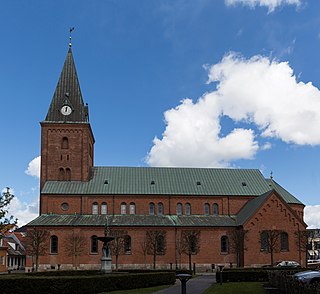
The Abbey of Our Lady, Aalborg was an early Benedictine monastery in Aalborg, Denmark. The former monastic church survived a parish church until 1876 when it was demolished. The present Vor Frue Kirke was built on the site between 1877 and 1878.

Sulsted Church, located in Sulsted, a small Danish town in northern Jutland, just north of Aalborg, was constructed c. 1150–1200 and features a large number of frescos or kalkmalerier, all created in 1548 by Hans Maler from Randers.

The Alexander Nevsky Church is the only Russian Orthodox church in Copenhagen. It was built by the Russian Government between 1881 and 1883, prompted by Princess Dagmar of Denmark's marriage to Alexander Alexandrovich on 9 November 1866 and their later ascent to the Russian throne as Tsar Alexander III of Russia and Tsaritsa Maria Feodorovna. The church is dedicated to the Russian patron saint Alexander Nevsky.
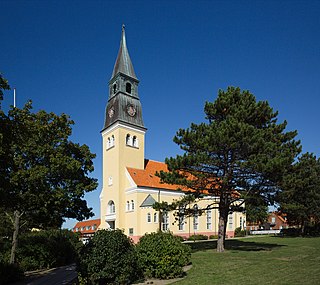
Skagen Church is a church located in the historic town centre of Skagen, Denmark.

Solbjerg Church is a church in the Frederiksberg district of Copenhagen, Denmark. It is located at 34 Howitzvej, just north of Frederiksberg Gardens, and is one of 16 churches which have been designated for closure by the Diocese of Copenhagen.

Hans Vilhelm Ahlmann was a Swedish and Danish architect. He is credited with designing and restoring a variety of churches in Denmark.

Sundby Church is a Church of Denmark parish church located on Amagerbrogade in Copenhagen, Denmark. Completed in 1870 to designs by Hans Jørgen Holm, it is the oldest church on the northern part of Amager.

Nakskov Church is the largest church in Nakskov on the west coast of the Danish island of Lolland. As Nakskov was mentioned in Valdemar's Census Book in the 13th century, the church probably dates to the same period.
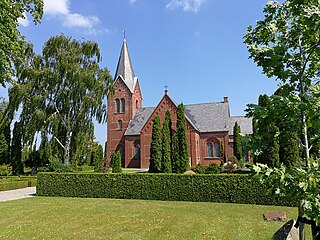
Bandholm Church is a Church of Denmark parish church located in the harbor village of Bandholm some 8 km (5.0 mi) north of Maribo on the Danish island of Lolland. It was built in 1874 by Henrik Steffens Sibbern to a cruciform plan in the Romanesque Revival style. Built of red brick, it consists of a chancel, a nave and a tower with a conical spire.
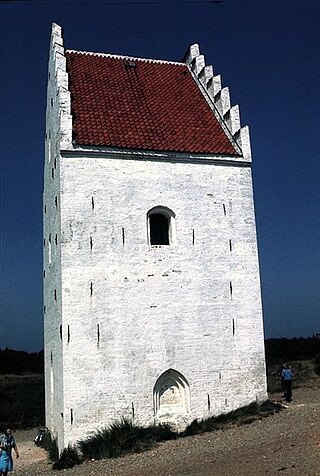
The Sand-Covered Church is the name given to a late 14th-century church dedicated to Saint Lawrence of Rome. It was a brick church of considerable size, located 2 kilometres (1.2 mi) southwest of the town centre of Skagen, Denmark. During the last half of the 18th century the church was partially buried by sand from nearby dunes; the congregation had to dig out the entrance each time a service was to be held. The struggle to keep the church free of sand lasted until 1795, when it was abandoned. The church was demolished, leaving the tower with crow-stepped gable as the only part of the original structure still standing.
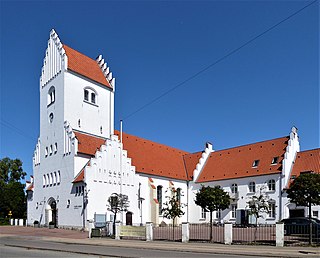
Philip's Church is a Church of Denmark parish church on Amager in Copenhagen, Denmark.

Skagen Odde, also Skagens Odde, sometimes known in English as the Scaw Spit or The Skaw, is a sandy peninsula which stretches some 30 km (19 mi) northeast and comprises the northernmost area of Vendsyssel in Jutland, Denmark.

Hulsig is a settlement and area of moorland and grey sand dunes in the Råbjerg Mile of the Skagens Odde peninsula, in northern Jutland, northern Denmark. The village lies along the Danish national road 40, to the southwest of the town of Skagen. The rugged heath area is protected under the title Hulsig Heath. Hulsig Station and Hulsig Church are located in the area. Hulsig is home to one of the country's few remaining flocks of dune sheep.
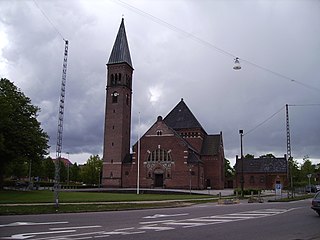
Ansgars Church is a church in Odense, Denmark, within the Diocese of Funen.

St Thomas Church is a church building of the Church of Denmark in the Frederiksberg district of Copenhagen, Denmark. It was designed by architect Carl Lendorf (1839-1918) and built in 1898.

Brønderslev Church is a Lutheran church in Brønderslev, Denmark. The church was designed by Valdemar Schmidt and built between 1920 and 1922.





















